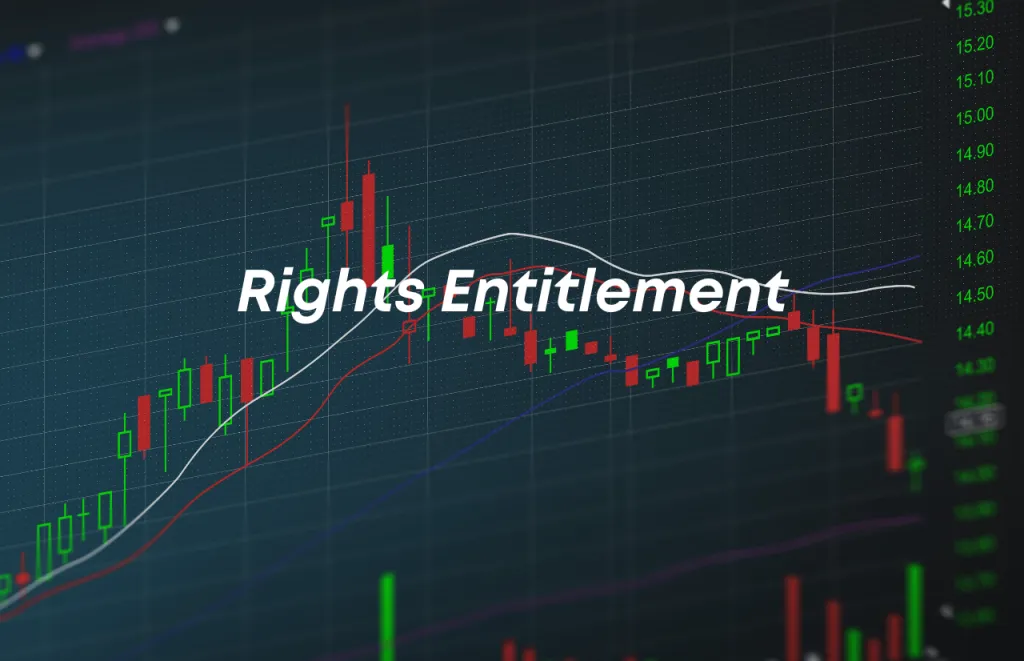What is Rights entitlement in the Share Market?

There are numerous options available for a publicly traded company to raise capital for upcoming ventures or to make significant changes to the company. Companies can raise capital through IPOs, OFSs, and a variety of other methods. As a result, another one if the procedure is right. When a company wishes to exceed its additional capital, it considers doing so with its shareholders via a rights settlement and issue. The concept of rights entitlement is, in comparison, the newest and most recent addition to the share market. The previous year, market regulators such as SEBI made it even easier to buy and sell rights entitlement. They made the transaction possible solely through electronic credit. Previously, shareholders had to physically submit all applications and documentation forms to get the rights issued.
To get a better understanding of the entire procedure and how it all works. Let’s first define rights entitlement and rights issues.
Rights Entitlement – Definition
The concept of the entire rights issue allows shareholders to purchase new shares in proportion to their existing shareholdings. The rights that are issued are sometimes priced at a market discount.
The amount and number of new shares that can be allotted for subscriptions but only by eligible shareholders are referred to as the rights issue. The concept of total rights entitlement is also nearly identical, with only a minor difference between the two. That difference is an exaggeration. It is in the rights entitlement to the credit if the shares are given in the Demat account of the eligible shareholders.
According to the market regulator SEBI, if a shareholder does not want to subscribe to the rights issue. He can let the right lapse. Another option that a shareholder can pursue is to trade the right of entitlement as a favour for another person in exchange for a certain amount of money. However, if a right entitlement is not subscribed to, settled, or renounced before its closing date, it lapses.

Why go for Rights Entitlement?
Before the entire concept of rights entitlement was made electronic. It took nearly 55-58 days to keep the rights entitlement list up to date. However, the entire process now takes much less time because the listing timeline has been reduced to approximately 31 days. Which is easy and simple for companies and shareholders because quick work is now referred to as the best work.
The main advantage of the it is that any investor or trader can easily purchase a company’s shares on the secondary market. Let me give you an example to help you understand. Assume that someone is a shareholder of axis and owns 10 shares of the company. Then they are not eligible for the rights entitlement. The other option, however, is as simple as the above-mentioned shareholder purchasing the right on the secondary market.
This opportunity allows shareholders to obtain a subscription for the right of axis, allowing them to purchase shares and stocks at a much lower price.
How do people lose money in Rights Entitlement?
We now know that if a company’s shareholder is eligible during the rights issue. The rights entitlement is all credited to the Demat account. Investors who want to back out and do not want to apply for rights issues have other options. Such as selling their rights entitlement to other investors and shareholders who are willing and able to buy the shares at a discounted price. We now understand how and why people lose money during the process.
In this, investors and shareholders can now lose money in two ways. Let’s keep reading to find out what those two methods are.
First, it occurs when a legitimate, capable, and eligible shareholder abandons the rights entitlement and does not apply for the rights issue. As a result, by failing to apply for the rights issue. They forfeit the value of their rights entitlement as well as their money. Rights entitlements are traded in the market for a very short time and for a very short term before they expire.
Second, investors lose money in the rights entitlement when another investor purchases the RE from an eligible shareholder of the listed company. Then does not apply or forgets to apply, for whatever reason, for the right of the issue before the application deadline expires.
And in these two ways, there are times when investors and shareholders lose money. Which is one of the most significant disadvantages of the rights entitlement process.
The Bottom Line
We sincerely hope that by now you have grasped the concept of rights issue and rights entitlement and how they interact. Any business, and any involvement of a shareholder or investor in the stock market. Carries the risk of losing money or not making much profit. As a result, no matter how cautious you are, risks will always exist, sometimes at a higher level than others.
Nonetheless, with all of the investment that the shareholders have made. They must have knowledge and a solid foundation on whatever they are working on and whatever their strategy is. It should also be noted that trading in rights entitlement begins on the day the issue is opened and ends four days before the issue is closed.
Follow us on Instagram.









